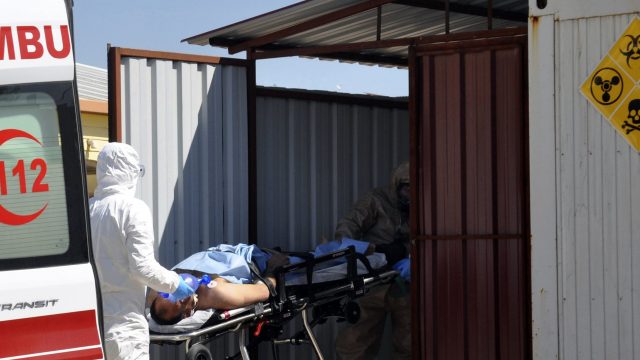
The death toll from a suspected chemical weapons attack in northern Syria has risen to 86, a monitoring group said.
The UK-based Syrian Observatory for Human Rights said those killed in Tuesday’s attack on the town of Khan Sheikhoun included 30 children and 20 women.
US President Donald Trump denounced the attack as an “affront to humanity”.
A Syrian opposition group said renewed air strikes had hit Khan Sheikhoun a day after the attack, which the Trump administration and others have blamed on the government of President Bashar Assad, as well as his main patrons, Russia and Iran.
Statement from @POTUS on today's chemical attack in #Syria pic.twitter.com/EkbNikTmzA
— Department of State (@StateDept) April 4, 2017
Mr Trump said the attack crossed “many, many lines” and cannot be tolerated.
He said: “That attack on children yesterday had a big impact on me. Big impact. My attitude towards Syria and Assad has changed very much.”
Mr Trump said the attack was “so horrific” and noted that it had killed “innocent people, small children and even beautiful little babies”, adding: “These heinous actions by the Assad regime cannot be tolerated.”
Today at the Security Council, @USUN Ambassador @NikkiHaley spoke about yesterday's chemical weapons attack in #Syria. pic.twitter.com/mKvcQjPKq2
— Department of State (@StateDept) April 5, 2017
US Ambassador Nikki Haley warned on Wednesday that US President’s Trump administration will take action against the chemical attacks – if the UN Security Council fails to act.
Haley – who said the attack bears “all the hallmarks” of President Bashar Assad’s government – urged the council at an emergency meeting to immediately approve a resolution drafted by the US, Britain and France that condemns and threatens consequences for the use of chemical weapons.
Damascus and Moscow denied they were behind the attack.
Russia’s defence ministry said the toxic agents were released when a Syrian air strike hit a rebel arsenal, an account Britain dismissed at an emergency UN session called in response.
"If a chemical weapons attack is not enough to demand action, what is?"
Ambassador @MatthewRycroft1 addresses #UNSC Syria debate pic.twitter.com/zHrSs0Ticn— Foreign Office ???????? (@foreignoffice) April 5, 2017
British Ambassador Matthew Rycroft said the UK had seen nothing that would suggest rebels “have the sort of chemical weapons that are consistent with the symptoms that we saw yesterday”.
Russia said it would submit information from its defence ministry to the Security Council debate.
Nobody is winning the war in Syria; everyone is losing. Time to end the horror and ease the suffering. #syriaconf2017 pic.twitter.com/rK1ghPxU9f
— António Guterres (@antonioguterres) April 5, 2017
A resolution drafted by Britain, France, and the US stresses the Syrian government’s obligation to provide information about its air operations, including the names of those in command of any helicopter squadrons on the day of the attack.
Diplomats were also meeting in Brussels for a major donors conference on the future of Syria and the region. Representatives from 70 countries were present.

The attack on Khan Sheikhoun killed dozens of people, leaving residents gasping for breath and convulsing in the streets. Videos from the scene showed volunteer medics using fire hoses to wash the chemicals from victims’ bodies.
The attack was reminiscent of a 2013 chemical assault that left hundreds dead and was the worst in the country’s six-year conflict.
The Turkish health ministry said three victims of the attack died while being treated in Turkey, and that 29 people wounded in the attack were still being cared for in hospitals in the country. Syrian opposition groups had previously reported 72 had died. Turkey set up a decontamination centre at a border crossing.
WHO is alarmed by serious reports of the use of highly toxic chemicals in an attack in #Idlib, #Syria https://t.co/fkk8JlyHRU
— WHO (@WHO) April 5, 2017
Syrian doctors said a combination of toxic gases is suspected to have been released during the air strikes, causing the high death toll and severe symptoms.
The World Health Organisation and the international medical charity Doctors Without Borders said victims of the attack appeared to show symptoms consistent with exposure to a nerve agent.
Pope Francis said during his general audience that he was “watching with horror at the latest events in Syria”, and that he “strongly deplored the unacceptable massacre”.
We have every indication that this was a sustained attack using aircraft. Only 1 air force has used such weapons in #Syria. @MatthewRycroft1 pic.twitter.com/kjnChtG6e4
— UKUN_NewYork (@UKUN_NewYork) April 5, 2017
Earlier, Foreign Secretary Boris Johnson said “all the evidence” he had seen so far in the latest chemical weapons attack in Syria “suggests this was the Assad regime… (that) did it in the full knowledge that they were using illegal weapons in a barbaric attack on their own people”.


Comments: Our rules
We want our comments to be a lively and valuable part of our community - a place where readers can debate and engage with the most important local issues. The ability to comment on our stories is a privilege, not a right, however, and that privilege may be withdrawn if it is abused or misused.
Please report any comments that break our rules.
Read the rules here